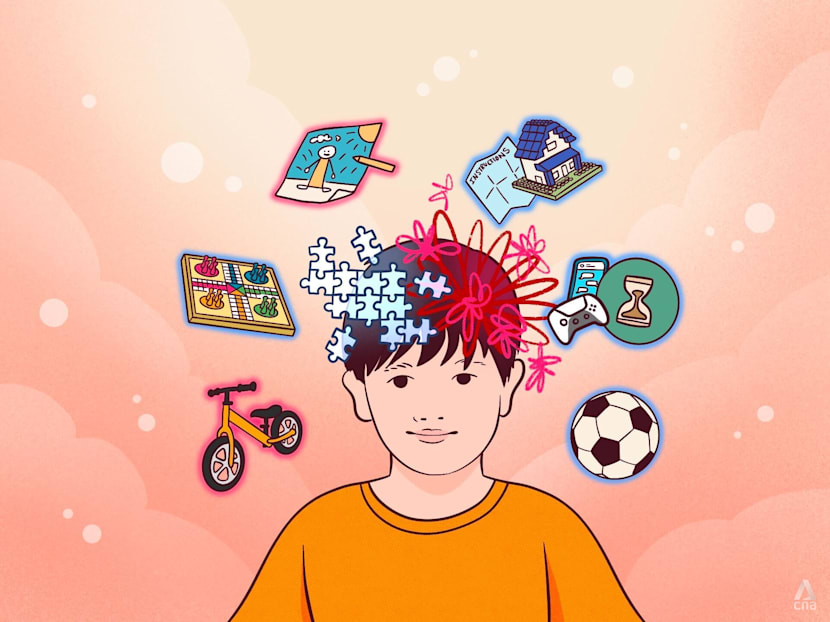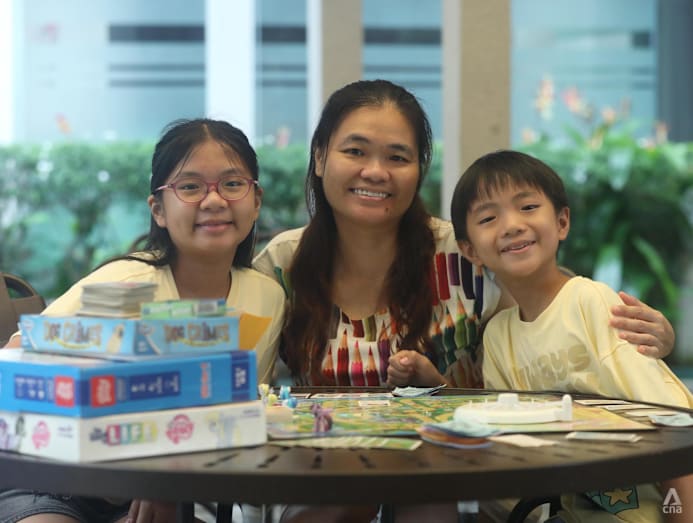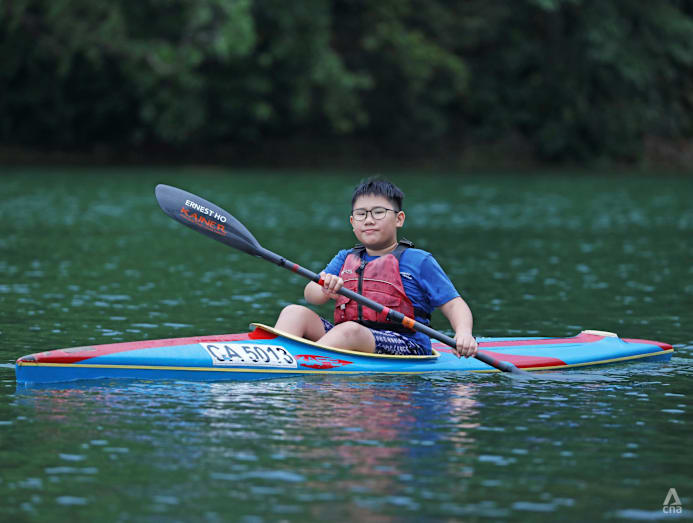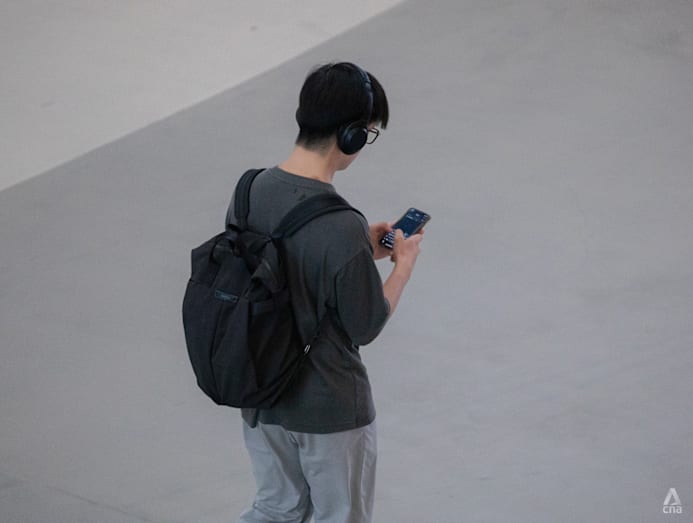Why Singapore's kids are no longer playing at void decks and corridors, and what's lost as a result
Experts say that while structured programmes offer safety and skill-building, child-led free play remains vital for developing social and problem-solving skills.

CNA TODAY found that even when children were given the chance to engage in unstructured playtime, many parents would closely supervise them. (Illustration: CNA/Nurjannah Suhaimi)

This audio is generated by an AI tool.
Twelve-year-old Geralyn Gui gets one precious hour each weekday, between school and her evening wushu lessons, to play with her friends.
Usually, they spend this time at a nearby playground playing tag or hide-and-seek, or visiting the library.
However, there is always an adult present to supervise – either Geralyn's mother, 49-year-old Selena Tay, who works as a flexi-adjunct teacher, or one of her friends' parents.
Once the hour is up, Geralyn has to head home and get ready for her two-hour wushu class, then it's back home for dinner, homework and bedtime before the routine starts all over again.
On weekends, Geralyn often tags along when Ms Tay attends events for her side hustle as a social media nanoinfluencer. Any play activities she gets to do are planned around her parents' schedules.
"We would also like her to play unsupervised, but the supervision is more for ensuring safety against predators and to be aware of the type of friends she interacts with, as we are more cautious," said Ms Tay.

Fellow parent Quek Jia Ling, 37, has created a similar regimen. Her two children, aged four and seven, split their afternoons between enrichment classes such as dance, swimming and abacus, and supervised play.
They are allowed half an hour of TV time after school each day but no internet at all.
Whenever possible on the weekends, Ms Quek takes her children out to explore playgrounds or to museum programmes designed for kids, where they can learn in air-conditioned and safe spaces.
"Like others, my kids spend a lot of time in school and enrichment classes, making it hard to meet up with friends. The hot weather makes it even harder to take them outside," she said, adding that while she values unstructured play, safety around strangers remains a concern.
These three children live out daily routines familiar in many Singaporean households today, where long school days and packed enrichment schedules leave little time for free play.
According to a 2024 study by non-profit Suncare SG of more than 1,000 parents with children aged three to six, almost one in five reported that their child spends less than an hour outdoors each day on weekends. The survey did not ask respondents about weekday playtimes.
CNA TODAY found that even when children are outdoors, much of their play time is structured, usually in the form of sports training or supervised play dates.
Globally, children's time for unstructured outdoor play has also been on the decline for decades.
A policy brief by the Alliance for Childhood, an international nonprofit organisation advocating for children's health and well-being, reported that by 2010, children in the United States were spending 50 per cent less time in free outdoor activities than they did in the 1970s.
Based on interviews with parents and youths, it seems that children are also not even playing with their friends online.
Most parents place strict screen-time restrictions on their pre-teens, so they have limited time online. Only when the kids grow older do they have the freedom to spend more time talking to their friends online, and do so.
Things were vastly different just a generation ago, which the parents themselves can attest to.
Ms Quek, recalling her own upbringing in the 1990s, said she spent at least one hour outdoors each day, visiting the playground near her home, with her mother nearby to keep watch.
"But as compared to my children, my social interactions in the past felt more spontaneous for sure. Today, playdates have to be scheduled around enrichment activities, and usually happen indoors."
Back then, it was as simple as stepping out of the flat and spotting a familiar face in the estate, she said. Someone would call out, "Play?" and within minutes they'd be downstairs, drifting between the playground and whichever corner of the neighbourhood they felt drawn to.
The contrast isn't lost on her when it comes to outdoor time: "Sometimes, I feel bad that my children have been spending so much time indoors, so I try to bring them out more."
Dr G Kaveri, a senior lecturer in early childhood education at Singapore University of Social Sciences (SUSS), noted that these days many parents tend to choose structured activities as they are perceived to "offer safety, supervision and predictability".
While structured programmes have their benefits, Dr Isabelle Gaffney, founder of counselling practice A Heapful of Hope and an adjunct lecturer from the National Institute of Education (NIE) said that children also need time to play and interact freely.
"Children who only see their friends at school may be limited in their ability to advance these friendships unless they get to grow them outside of school. During preteen and teen years when the support and acceptance of peers are key, missing out on time together can curtail their main outlet for sharing emotions and cause them to feel left out," she said.
Dr Gaffney, who is also a registered play therapist and licensed counsellor (USA), added that this can significantly affect their ability to foster, deepen and repair valuable friendships during a critical stage of self and social development.
WHEN PLAY IS A REGIMEN
To be sure, parents sign their children up for structured programmes with the best of intentions of helping their children pick up skills outside of the classroom.
Dr Shaun Ho, 46, enrolled his 11-year-old son, Ernest, for a twice-a-week canoeing programme at the Active SG Canoe Academy where activities blend fun with gentle competition.
Dr Ho appreciates that qualified coaches are always present, providing a safe environment where Ernest can learn to manage risk.
"My biggest consideration is learning – developing skills that you wouldn't otherwise be able to, at home or even in a structured academic setting," he said of the sessions at MacRitchie Reservoir.
"Competition is inevitable as they grow up. It's good to start cultivating that sense in small, manageable ways, along with teamwork and empathy."
Ernest enjoys the programme, finding it a good mix of challenge and fun.
"Some parts of training can be more serious, especially the paddle drills, but overall it's fun because I get to talk to my friends a lot," he said.

Ms Quek noted that rising academic pressures and the abundance of available enrichment options have changed how children spend their time.
"When you see your child's classmates attending so many classes, you tend to wonder if your own child is losing out by not doing the same," she said.
For her, enrichment classes are not just a tool for academic success but also an avenue for her kids to explore new interests, especially at a time when traditional careers are being disrupted by technology, she added.
"I won't deny that the search for hidden skills is also a search for something that could potentially help in the direct school admission exercise," she said.
She prefers for her children to be engaged in activities with learning objectives, such as attending a museum programme because such activities are educational and provide a safe space to socialise.
Outdoor play, while still valuable, is harder to manage, she said.
"Beyond safety issues concerning strangers, Singapore's weather is simply too hot – it's for sure much warmer now than during our time," she said.
CNA TODAY found that even when children were given the chance to engage in unstructured playtime, many parents would closely supervise them despite Singapore having one of the lowest crime rates in the world.
Ms Ruchi Parekh, 44, knows the importance of play, and makes sure her kids spend time outdoors before they are allowed any screen time.
When out with friends, her 13-year-old daughter enjoys more independence, but her nine-year-old son remains under close watch of an adult during outdoor play, as she worries that younger kids can be more easily targeted by predators or get into risky situations where they might not know how to react.
"You may call me an extra cautious parent, but I am okay with that if it protects my children," she said.

The thing is, most parents are fully aware of the benefits of free play, but many who spoke to CNA TODAY said Singaporean children these days lack spaces where they can interact freely and safely.
Ms Rohainizah Adnan, 42, cited the limited opportunities for organic connections, with rising academic expectations and devices often taking up children's free time, adding that playground noise complaints also worry her.
"We need to let children be children and have spaces for them," said the mother of a 12-year-old.
While common spaces like community game courts may still look the same as they always have, their use has been curtailed by regulations and restricted hours, a consequence of Singapore's dense living conditions, she noted.
"What feels lost is the space for free, no-rules play – kids playing tag on the streets until the lights come on, teens gathering at void decks without being told to keep quiet."
Geralyn's mother Ms Tay agreed, saying that kids need more supervision these days partly because of changes to Singapore's built environment.
Compared to older Housing and Development Board (HDB) blocks which had open void decks, long corridors and wide stair landings, newer HDB flats have fewer open spaces that are ideal for play, and neighbours are more likely to complain about the noise, she said. This means children have to go farther from home to play.
Such concerns become even more pertinent as children enter their teenage years, when finding safe and organic spaces to socialise independently becomes even more challenging, said Ms Geraldine Tang, 54, mother to a 14-year-old daughter.
"There should not just be playgrounds for young children and gyms for adults… Teenagers also need safe places to talk, relax and just be themselves," she said.
She said her daughter and friends prefer quiet indoor spots where they can come and go as they please, chat and enjoy snacks and drinks at their own pace. Theme parks, gardens or cinemas, she added, are either too costly or too hot.
In the absence of physical third spaces where teens feel comfortable hanging out for free, the internet has of course become the new playground.
Ms Loh Yong Qi, now 19, struggled to make friends throughout her schooling life but began making friends online when she was 15 through social media platforms such as Lemon8 and Instagram, bonding with strangers-turned-friends over shared interests like K-pop groups.
When asked what would have encouraged her to socialise in person as a teenager, she said that more events or social clubs for people her age would help, but noted that in Singapore, most experiences are targeted at those aged 20 and above.
Many meet-ups are geared towards working adults, making it hard for teens to meet peers in the same age range for activities she’s interested in, like run clubs or bar events.
She added that initiatives like Footnotes, which hosts curated events aimed at fostering genuine connections, are the kind of experiences she would like to join, but these, too, are aimed at adults.
THE NEW PLAYGROUND: ONLINE PLATFORMS
Dr Gaffney of NIE said when children have very limited exposure to physical interaction and unstructured play, they may find it awkward and difficult to connect with their peers in person.
"If children become accustomed to connecting with peers online, this is their established normal," she said.
As children grow older, this early pattern often carries over, with unstructured playtime increasingly taking place online.
The move to online interaction, which feels inevitable for many, has its pros and cons.
With polytechnic studies and part-time work filling her days, Ms Hannah Lizel Opina Caspe's interactions with friends now largely take place via screens.
But while digital interactions help the 18-year-old stay updated with peers and express herself, she still finds real-life conversations more meaningful.
"Usually (when we talk online), it's just brief chats about what they're doing. For building real connections, in-person interactions work better," she said.
"I'm generally closer to the friends I spent in-person time with back in secondary school, while the newer ones I mostly stay in touch with online feel more like casual friends."

For teens like Ms Caspe, digital-heavy interactions are often inevitable due to busy schedules, but experts caution that establishing these patterns at a younger age may have developmental implications.
Dr Kaveri from SUSS said that while digital-heavy interactions offer convenience, they can also affect children’s social skills through reducing their ability to handle conflicts while encouraging online identities that may hinder real-world interactions.
Ms Rohainizah observed these effects in her son, noting big changes in his behaviour depending on how much time he has spent interacting with friends online.
"With less screen time, he engages much better offline and is less snappy. Patience is the most stark difference, especially when tutoring his younger sister," she said.
Since then, whenever she notices the adverse effects of increased screen time on her son, she takes his devices away to help him recalibrate and readjust to life without constant digital stimulation.
Mr Xavier Ong, 44, meanwhile, observed that his eldest son, 14, became more easily agitated the more time he spent online, and had picked up vulgar language from people he interacted with on the internet.
Multi-player games sometimes trigger aggression between his sons, with his elder hitting the younger when "killed" in the games, he added.
Mr Ong said he went through a similar phase himself in his youth, but noted that managing digital usage is harder today because online games are more interactive and engaging.
"My wife and I set a consensus that if our children break our trust, we can always use parental control settings to switch off the devices," he said.
Ms Loh, the 19-year-old who found community online, agreed that spending too much online can affect one's real-life behaviour, so she reassesses friends who use excessive vulgar language and goes for runs or cycles without her phone to clear her mind when she starts to notice herself being affected by the things she consumes online.
"Hearing curse words everyday in multi-player games and voice calls desensitises you, but we also need to have the discipline to think critically instead of just being so 'brainrotted'."
ONLINE FRIENDS STILL BETTER THAN NO FRIENDS
These broad trends are concerning especially as a recent study showed that younger Singaporeans appear to have fewer offline friends than older generations.
The report published by the Institute of Policy Studies (IPS) in May 2025 revealed that younger adults in Singapore, aged 18 to 35, tend to have fewer close friends than those in older age groups.
In 2024, they reported an average of 6.04 close friends, down from 7.68 in 2013.
By comparison, those aged 36 to 50 had 6.77 close friends on average, and 51 to 65-year-olds had 7.86, with the report suggesting that younger adults are a demographic particularly at risk of social isolation.
Researchers noted that the pandemic likely intensified these challenges, limiting face-to-face interactions and deepening social divides – a trend that could have lasting effects on well-being and the ability to build meaningful, supportive relationships.

Associate Professor Choo Hyekyung from National University of Singapore (NUS) added that when virtual connections replace face-to-face interactions, children may struggle to develop social skills, feel isolated despite being connected online and face greater mental health risks.
While digital socialisation offers some developmental opportunities, face-to-face interactions provide deeper, longer-lasting benefits that online interactions cannot fully replicate, she added.
"Face-to-face interactions offer irreplaceable opportunities for reading non-verbal cues, responding emotionally in real-time, coordinating physical cues with others, and resolving conflicts – all of which are diminished or absent in digital spaces," said Dr Choo.
That said, several youths told CNA TODAY that given their regimented lives and busy schedules, having online interactions with their friends is better than having no interactions at all.
Take 14-year-old Germaine Tan, the daughter of Ms Tang, who juggles school with taekwondo training across multiple commitments: the national development squad, co-curricular activity (CCA) in school, and extra training at a club – totalling at least 19 hours a week.
She has little free time, and when she does, she often uses her phone to stay in touch with friends by sending each other TikTok videos about things to do, or planning their next outing. These outings are rare, happening only once or twice a year during the school holidays.
Ms Tang said: "We don't restrict her digital usage, aside from occasional reminders to take a break. She already has very little time to play, so we want to let her unwind."
Other youths, meanwhile, have found true connection in the digital space.
Ms Loh, the 19-year-old who struggled to make friends in school but found community online, said the ease of connection on the internet – where a simple "like" or comment can spark a friendship – has helped her find the companionship that eluded her during her school days.
"In real life, I can't really fit in or find a community. But online, it feels effortless as we connect over common interests."
While parents were initially worried about her making friends online, they eventually realised that she was finding meaningful and positive connections that made her happier, and this eased their concerns, she said.
"Sometimes parents should try to understand the benefits of online connections," she said, adding that when her own parents made the effort to understand her experiences, it opened up their communication and made her feel cared for, encouraging her to share even more freely with them.
Dr Gaffney from NIE however said that while online connections can be helpful, they have their limitations.
"Online peer engagement can still help meet some socio-emotional development needs, but they cannot be a substitute for naturally evolving friendships that integrate both online and physical interaction," she said.















